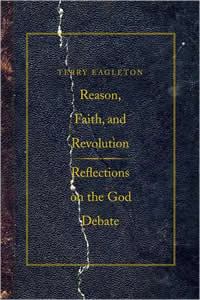Book Notes
 Terry Eagleton, Reason, Faith, and Revolution; Reflections on the God Debate (New Haven: Yale, 2009), 185pp.
Terry Eagleton, Reason, Faith, and Revolution; Reflections on the God Debate (New Haven: Yale, 2009), 185pp.
The atheists Richard Dawkins and Christopher Hitchens have suffered their share of critical reviews, but perhaps none have been as categorical or vociferous as this one from their fellow Brit Terry Eagleton. By some accounts, Eagleton is the most influential literary critic in Britain; by all accounts he is an unreformed intellectual bad boy, and not only for his Marxist socialism. In the present volume he combines his rapier wit, encyclopedic knowledge, and spirited prose to dismiss the "Ditchkins" as pitiful pikers whose ramblings deserve our disdain.
True, the "Ditchkins" make some good points. But their sloppy thinking, strident language, and dogmatic condescension are warning signs of an atheism bought "on the cheap." Their stock in trade includes vulgar caricatures of religion, an "abysmally crude [and] infantile version of what theology has traditionally maintained," ignorance, cultural supremacism, an "eminently suburban" love affair with the Enlightenment myth of liberal progress, the refusal to acknowledge that religion has done any good anywhere or that science has done any harm, and an either/or mentality that ignores ambiguity. They are defenders of the political status quo, and hardly the revolutionaries they purport to be.
Eagleton was raised as an Irish Roman Catholic in working-class England, and although he has been ambiguous about his own personal faith, he says that one reason he wrote this polemic was to defend the faith of his forbears as something worthy of a defense. Christendom has betrayed the truly revolutionary nature of original Christianity, he says, and so in addition to attacking the secular left he undertakes the Kierkegaardian task of distinguishing between the genuine article and its many counterfeits. The revolutionary gospel does not conform to the geo-political and economic ways of the world and, in the end, "is absurdly, outrageously more hopeful than liberal rationalism" and its myth of progress. "Any preaching of the Gospel which fails to constitute a scandal and affront to the political state is in my view effectively worthless."
Along the way, Eagleton has harsh words for capitalism, which he considers inherently atheistic (as did Karl Barth), postmodernism, Oxford High Table, globalization, the corridors of power in Washington and London, and western civilization's failure to understand and engage Islam in a meaningful way. If you enjoy unapologetic iconoclasm of the highest order, Eagleton makes for a good read. In addition to his forty books, he's scheduled to deliver a single Gifford Lecture in March 2010.


